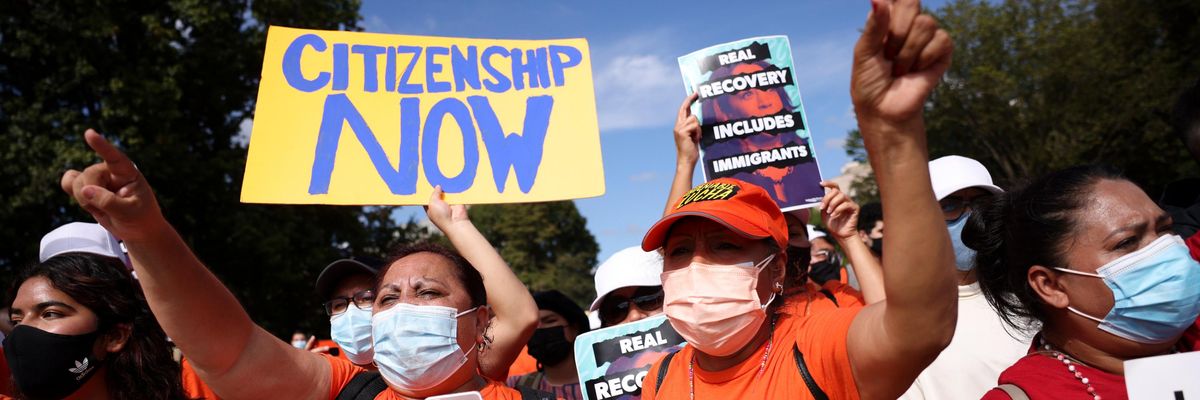The immigrant share of the labor force reached a record high of 18.6% in 2023, according to our analysis of Current Population Survey, or CPS, data from the Bureau of Labor Statistics. Anti-immigration advocates have been out in full force, using this as a talking point for deeply misguided commentary and analysis that roughly translates to “immigrants are taking all our jobs.”
The reality is that the economy does not have a fixed number of jobs, and what we see today is a growing economy that is adding jobs for both immigrants and U.S.-born workers. Here are six key facts that show immigrants are not hurting the employment outcomes of U.S.-born workers.
- The unemployment rate for U.S.-born workers averaged 3.6% in 2023, the lowest rate on record. Obviously, immigration is not causing high unemployment among U.S.-born workers.
- The share of prime-age U.S.-born individuals with a job is at its highest rate in more than two decades. In 2023, the prime-age (ages 25–54) employment-to-population ratio (EPOP) for U.S.-born individuals was 81.4%, up from 80.7% in 2019 and now at its highest rate since 2001.
- The prime-age labor force participation rate (LFPR) for U.S.-born individuals is also at its highest rate in more than two decades. In 2023, the LFPR for prime-age U.S.-born individuals was 83.9%, up from 83.3% in 2019 and now at its highest rate since 2002. Further, the increase in the U.S.-born prime-age LFPR over the last year was the second highest on record—below only the increase that occurred the year before last.
- The prime-age LFPR of U.S.-born men without a bachelor’s degree grew at a record pace in each of the last two years and is above its pre-Covid trend. We focus here on prime-age men without a bachelor’s degree because though the immigrant population is comprised of men and women of all education levels, immigrants are somewhat disproportionately concentrated among men without a college degree (in 2023, the immigrant share of the overall labor force was 18.6%, but it was 20.0% of men without a college degree). That means that if recent immigration were affecting labor market outcomes of U.S.-born workers, it would be more easily detected among workers in this group. However, the LFPR of these workers is also beating expectations. It is clear the labor market is both absorbing immigrants and generating strong job opportunities for U.S.-born workers, including those in demographic groups potentially most impacted by immigration.
- Though the immigrant share of the labor force reached a record high in 2023, immigrant labor force growth is not occurring at an unprecedented rate. From 2019 to 2023, the immigrant labor force grew 2.3% annually on average, according to our analysis of CPS data. That is strong growth, but it’s roughly one-third the rate the economy experienced between 1996 and 2000 (which, just like 2022 and 2023, was a period of very low unemployment—and strong employment growth—for U.S.-born workers). Immigrant inflows into the labor force over the last year alone were also not unprecedentedly high—for example, the pace was slower than in 2022 and slower than three of the years from 1996–2000.
- Immigrants are an integral part of our labor market, filling gaps caused by demographic changes in the United States and contributing to strong economic growth. The immigrants that make up 18.6% of the U.S. labor force are playing key roles in numerous industries and are employed in a mix of lower, middle, and higher-wage jobs. And as the Congressional Budget Office recently reported, immigration is contributing to strong economic growth—with future immigration forecasted to boost real gross domestic product by 2% over the next 10 years—as well as increasing government revenue. Immigrants are also complementing U.S.-born workers by contributing to overall population and workforce growth. The U.S. Census Bureau projects that if the U.S. were to have lower-than-expected immigration levels, the population would begin to decline in 20 years, and if there were suddenly zero immigration, the population would begin to decline next year, deeply harming economic growth.
As these six facts show, the idea that immigrants are making things worse for U.S.-born workers is wrong. The reality is that the labor market is absorbing immigrants at a rapid pace, while simultaneously maintaining record-low unemployment for U.S.-born workers.
Claiming that immigrants are making things worse for U.S.-born workers is often used as an intentional distraction from dynamics that are actually hurting working people—such as weak labor standards and enforcement, anti-worker deregulation, weak labor law that fails to protect workers’ rights to unions and collective bargaining in the face of coordinated and well-funded attacks, and other dynamics that result in too much power in the hands of corporations and employers.
While there’s no question that the immigration system desperately needs updating so that workers are adequately protected, it’s important to remember that it is employers that underpay and exploit workers based on their immigration status—committing workplace violations against those who lack status at a vastly higher rate than U.S.-born workers. And it is employers that regularly and even systematically steal wages from workers who only have a temporary, precarious status provided by a work visa. The resulting two-tiered system of rights in the workplace prevents immigrants from asserting and enforcing their rights. Reform efforts in Congress and the executive branch should thus focus on providing status and work authorization to those who lack it and compelling employers to follow the law, rather than more funding for, and draconian measures on, border enforcement, deportations, and detaining immigrants.
If those who mischaracterize immigration as bad for the economy and for U.S.-born workers really care about improving wages and working conditions for U.S.-born workers, they should focus on pushing for labor law reform and strong labor standards and helping ensure that all workers—regardless of immigration status—have equal and enforceable rights in the workplace.
